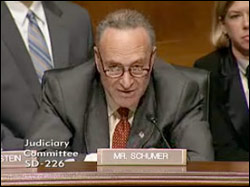June 16, 2009
Original Content. This linked video is over 212 minutes long. To view the pertinent section of the hearing, slide the progress bar below the video to the right about 80% of the way to the 174th minute mark. Click this link to view the full video. Video provided by the United States Senate Committee on the Judiciary. |
A Drug War Inside the GovernmentBy: Bradley C. Schreiber Chevy Chase, Md.
The Obama administration is taking aggressive measures to ensure that the drug violence in Mexico does not spill over more than it already has into this country. But a dispute between two federal agencies, if not remedied, will seriously hamper these efforts — and prevent thousands of experienced criminal investigators from doing their utmost to secure our borders. Immigration and Customs Enforcement is the largest investigative arm of the Department of Homeland Security and, under current law, its agents can investigate any crime with a connection to the American border, from weapons trafficking to child pornography. Any crime, that is, except drug crimes. The ability to investigate such crimes, known as Title 21 authority, rests with the Drug Enforcement Administration, which is part of the Department of Justice. The attorney general can and, under certain circumstances, does give other federal agents the power to investigate drug crimes. But a longstanding dispute with the D.E.A. severely limits the number of immigration and customs enforcement agents who are given Title 21 authority. Right now, it’s fewer than 1,500 of 6,000 or so agents. During my tenure in the Department of Homeland Security, I worked directly with Immigration and Customs Enforcement and the D.E.A. on Title 21 authority. While both sides claim there are several issues at play, based on my experience, the dispute really boils down to concerns by the D.E.A. that another federal department is encroaching on its turf. While fears of ceding jurisdiction are not new to federal agencies, the worries at the D.E.A. are groundless. The agency is second to none as the country’s primary drug investigation force. Immigration and Customs Enforcement, on the other hand, is a multi-mission agency whose criminal investigation jurisdiction will continue to be limited to offenses connected to the American border. The immigration and customs enforcement agency does not have the capacity to take over the D.E.A’s role nor would it want to do so, given its other duties. However, allowing Immigration and Customs Enforcement to handle drug investigations at our borders, where it already has a significant presence, would greatly strengthen our efforts to stop the flow of narcotics that fuels the drug violence both here and in Mexico. It would also let the D.E.A. shift its own resources to other domestic and international investigations. This situation is all the more critical because the F.B.I. has severely reduced its anti-drug efforts to concentrate on fighting terrorism and the Drug Enforcement Administration’s staffing levels have hardly increased in recent years. If Immigration and Customs Enforcement were given Title 21 authority, the United States would be able to add thousands of drug investigators immediately — and without spending any additional money. Despite numerous efforts by the two agencies to reconcile their differences, too much animosity exists for them to resolve this problem on their own. The best solution is for Janet Napolitano, the secretary of homeland security, and Eric Holder, the attorney general, to work out this dispute once and for all. While Ms. Napolitano recently told the Senate that she has begun discussions with the Justice Department, there is no indication that this issue will be resolved soon. Every day that goes by is another day we are at risk, and we can no longer allow this interdepartmental dispute to contribute to that risk. By giving Immigration and Customs Enforcement agents full and permanent Title 21 authority, the Obama administration can help strengthen our border — quickly, cheaply and decisively. Bradley C. Schreiber, the president of a government relations company, was a senior adviser at the Department of Homeland Security from 2007 to 2009. |


